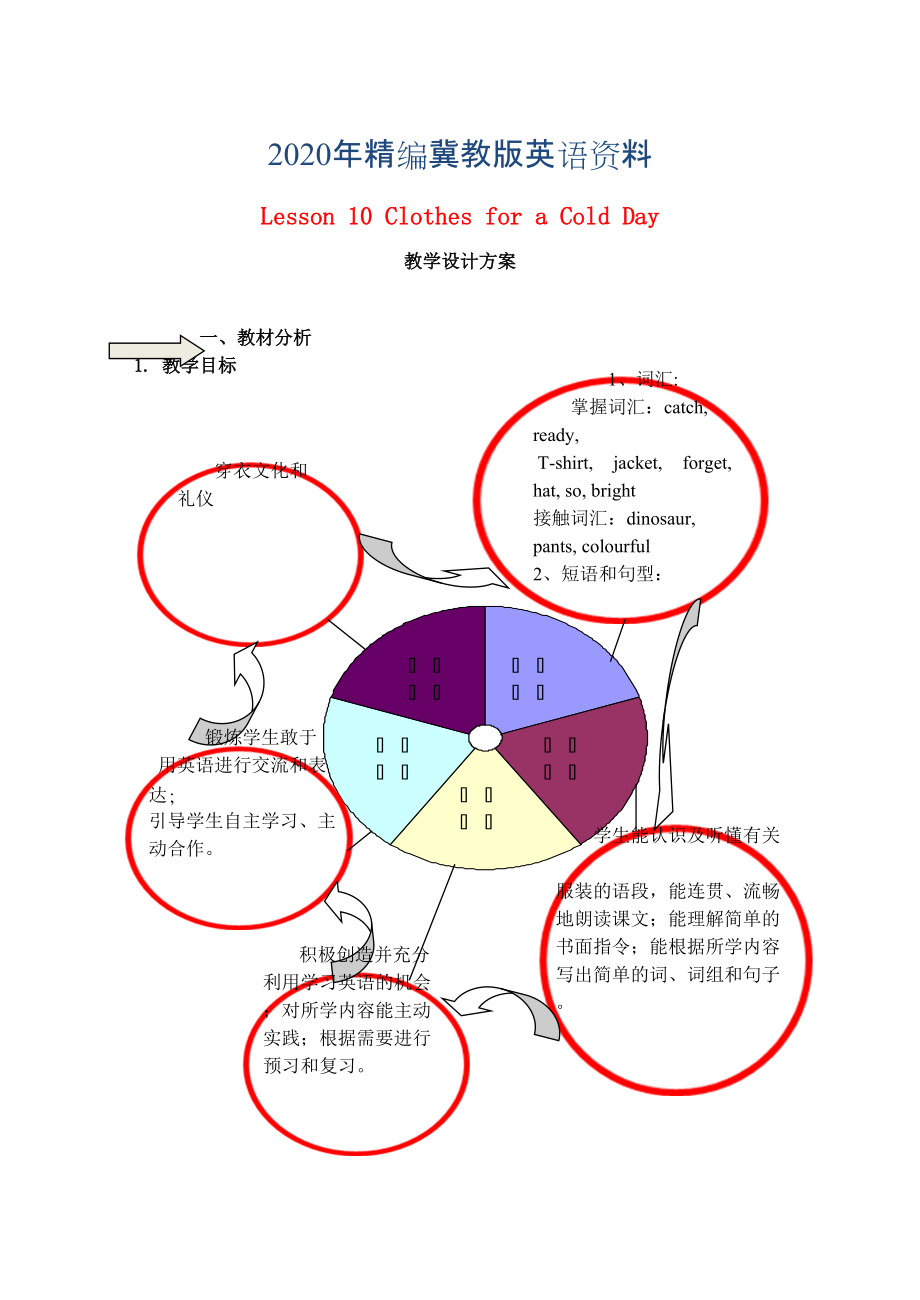《2020年【冀教版】七年級(jí)上冊(cè):Unit 2 Lesson 10 Clothes for a Cold Day教案》由會(huì)員分享,可在線閱讀�����,更多相關(guān)《2020年【冀教版】七年級(jí)上冊(cè):Unit 2 Lesson 10 Clothes for a Cold Day教案(3頁(yè)珍藏版)》請(qǐng)?jiān)谘b配圖網(wǎng)上搜索。
1�、2020年精編冀教版英語(yǔ)資料
Lesson 10 Clothes for a Cold Day
教學(xué)設(shè)計(jì)方案
一、教材分析
1��、詞匯:
掌握詞匯:catch, ready,
T-shirt, jacket, forget, hat, so, bright
接觸詞匯:dinosaur, pants, colourful
2�、短語(yǔ)和句型:
catch a cold, be ready for…, go back
put on, go well with, take… all out of
3. 功能意念: 談?wù)摲b和天氣;
給出建議���。
2�、
1. 教學(xué)目標(biāo)
穿衣文化和禮儀
鍛煉學(xué)生敢于
用英語(yǔ)進(jìn)行交流和表
達(dá); 引導(dǎo)學(xué)生自主學(xué)習(xí)���、主動(dòng)合作�����。
學(xué)生能認(rèn)識(shí)及聽懂有關(guān)
服裝的語(yǔ)段���,能連貫、流暢地朗讀課文�;能理解簡(jiǎn)單的書面指令;能根據(jù)所學(xué)內(nèi)容寫出簡(jiǎn)單的詞���、詞組和句子�����。
積極創(chuàng)造并充分利用學(xué)習(xí)英語(yǔ)的機(jī)會(huì)�����;對(duì)所學(xué)內(nèi)容能主動(dòng)實(shí)踐�;根據(jù)需要進(jìn)行預(yù)習(xí)和復(fù)習(xí)。
2. 教學(xué)重���、難點(diǎn)
It’s cold / raining / hot today.
catch a cold, put on st
3、h. ( take off sth. ) , go well with
I like / don’t like to wear …
He / She likes / doesn’t like to wear …
Don’t forget sth.
二���、學(xué)生學(xué)情分析
七年級(jí)的學(xué)生對(duì)于服裝的搭配很感興趣���,在平時(shí)的生活中也對(duì)此比較關(guān)注。學(xué)生對(duì)動(dòng)詞短語(yǔ)的掌握現(xiàn)在還比較薄弱��,需要不斷地鞏固和練習(xí)�����。
三、教學(xué)準(zhǔn)備
教師準(zhǔn)備
CAI 課件
學(xué)生準(zhǔn)備
復(fù)習(xí)服裝詞匯���,預(yù)習(xí)課文�。
四�、教學(xué)步驟
Step 1. Class
4、 Opening and Review.
Show pictures of clothes and ask Ss about the owners of these things. (Review the target language : ( Whose…is this/ are these? It’s …/ They are…)
Show pictures of different weather and ask Ss to choose the correct clothes for different weather to help lead the new content i
5��、n.
【設(shè)計(jì)思路】本課內(nèi)容和之前學(xué)習(xí)過的服裝知識(shí)有關(guān)�����,服裝和天氣是本課的主線��,學(xué)生對(duì)此有基本的常識(shí)��。所以可以利用復(fù)習(xí)的環(huán)節(jié)做出自然的過渡�����。
Step 2. Introduction.
Show the teaching content to Ss, make sure they get the general ideas to the content of this lesson.
【設(shè)計(jì)思路】在每節(jié)課新授課開始前給學(xué)生展示本節(jié)課的重難點(diǎn)���,有助于學(xué)生在學(xué)習(xí)中做到心中有數(shù)��,也利于與之后的鞏固總結(jié)環(huán)節(jié)相對(duì)應(yīng)���。
Step 3. Part 1 You may catch a cold.
6��、
1. Play the flash , ask Ss to listen to the dialogue and find out “ Who may get a cold?”.
2. Play the flash again, ask Ss to listen and repeat. Make sure Ss understand the dialogue. Do Activity 1 in Let’s Do It! While listening and repeating, tell Ss to try to guess the meaning of some new struct
7��、ures ( be ready for, say goodbye to, go back, put on, take off, go well with ).
3. Check out the meanings of these phrases. Make Ss try to make sentences using the phrases if they can use them properly.
4. Finish Activity 2 in Let’s Do It! Check out the understanding of Part 1.
Step 4. Part 2
8�����、Colourful Clothes
1. Play the flash and ask Ss to listen and fill in the blanks.
2. Play the flash again to make them listen and chant with it.
【設(shè)計(jì)思路】 英語(yǔ)的小節(jié)奏���、詩(shī)歌、歌曲在英語(yǔ)學(xué)習(xí)中往往能帶給學(xué)生快樂�����。這首小節(jié)奏將色彩與服裝糅合起來�����。在幫助學(xué)生學(xué)習(xí)目標(biāo)語(yǔ)言的同時(shí)�����,還能培養(yǎng)學(xué)生的語(yǔ)音��、語(yǔ)調(diào)�。
Step 5. Culture Tips.
Show a word TPO to make Ss guess what it means.
9、 Tell Ss something about clothes culture and manners.
【設(shè)計(jì)思路】 培養(yǎng)學(xué)生的文化意識(shí)是新課程標(biāo)準(zhǔn)的五維目標(biāo)之一���。本節(jié)課主要以服裝搭配和天氣的學(xué)習(xí)為project��,故服飾與禮儀文化的知識(shí)是學(xué)習(xí)不可或缺的部分�。
Step 6. Conclusion.
Make Ss evaluate themselves by discussing what they have learnt in this class. Help Ss know the key content of this lesson.
【設(shè)計(jì)思路】幫助學(xué)生建立起對(duì)自己在每節(jié)
10�、課中的學(xué)習(xí)進(jìn)行評(píng)價(jià)和整理的好習(xí)慣。也可減少學(xué)生間的學(xué)習(xí)效果的個(gè)體差異�����。
Step 7. Feedback.
Ask Ss to finish Activity 3 in Let’s Do It! Fill in the blanks with the correct forms of the words or phrases in the box.
【設(shè)計(jì)思路】 本課的重點(diǎn)短語(yǔ)在學(xué)習(xí)���、練習(xí)�����、總結(jié)之后��,通過這一環(huán)節(jié)得到學(xué)生掌握情況的反饋�。要在反饋中及時(shí)發(fā)現(xiàn)問題�,解決問題�。
Step 8. Homework
1. Learn the new words and expressions by heart.
2. Using the target language to interview your parents. Write the result down.
3. Prepare for the next lesson.
五��、教學(xué)反思
培養(yǎng)學(xué)生的文化意識(shí)是新課程標(biāo)準(zhǔn)的五維目標(biāo)之一�。教師在授課的過程中要有意識(shí)地收集各種資源,通過圖片�、影片、歌曲等多種形式�,培養(yǎng)學(xué)生跨文化的交流意識(shí)。也要鼓勵(lì)學(xué)生自己尋找相關(guān)的文化背景知識(shí)�,豐富對(duì)單元話題的理解。
 2020年【冀教版】七年級(jí)上冊(cè):Unit 2 Lesson 10 Clothes for a Cold Day教案
2020年【冀教版】七年級(jí)上冊(cè):Unit 2 Lesson 10 Clothes for a Cold Day教案

